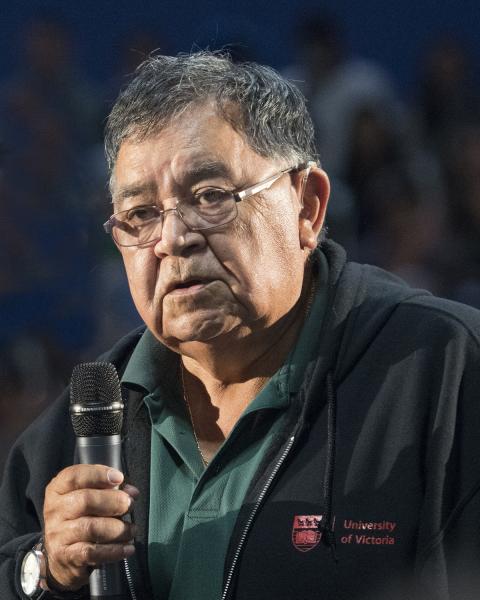Inspiring resilience recognized at convocation
- Mike McNeney

The University of Victoria will present two honorary degrees for outstanding achievements in Indigenous advocacy and public service during fall convocation ceremonies.
Baptiste (Skip) Dick, Honorary Doctor of Education (DEd)
Skip Dick—through his decades of work in education and youth athletics—has influenced countless individuals in the Songhees Nation and in communities around the province, impressing upon them the need to “live, speak and work with a good mind and a good heart.”
After a childhood in which he was taken from his home in Victoria and placed in a residential school in Kamloops, and despite everything he experienced in that time, he has made it his life’s work to ensure a positive impact on people he meets, helps or mentors.
At UVic, his involvement in the Elders’ Voices program has supported students, staff and faculty members. His presence has also been felt at Camosun College (starting from the 1970s, when he was the Aboriginal student counsellor) and in schools across Vancouver Island.
He co-founded the Victoria Native Friendship Centre, the Victoria T-Bird Soccer Club and, in 1989, he was named Manager of the Year by the BC Lacrosse Association.
Captain Trevor Greene, Honorary Doctor of Education (DEd)
Captain Trevor Greene is perhaps the best-known non-fatal Canadian casualty of the conflict in Afghanistan.
His life nearly ended in 2006. During a meeting between peacekeepers and village elders, Greene set aside his weapon and removed his helmet as a sign of respect. A 16-year-old boy approached from behind and struck him with a stone axe, shattering his skull and injuring the areas of his brain that control movement and walking.
It seemed he would remain minimally conscious, requiring long-term care. However, primarily with the aid of his wife Debbie Greene, he has made remarkable progress and is able to walk with the use of a walker. He is an effective advocate and inspiration for brain injury survivors.
As well, Trevor and Debbie have been long-term collaborators in brain injury research conducted at UVic and Dalhousie University, primarily through the use of functional magnetic resonance imaging (fMRI).
He and Debbie co-wrote the book, March Forth. Prior to joining the army, he wrote Bad Date: The Lost Girls of Vancouver’s Low Track, an early account of the serial murder of prostitutes on the Downtown Eastside.


